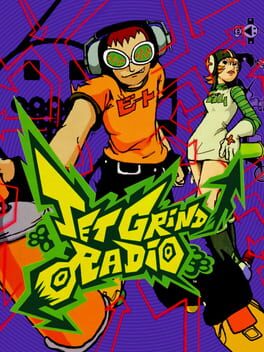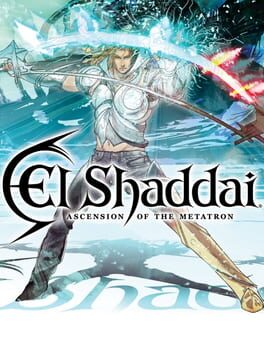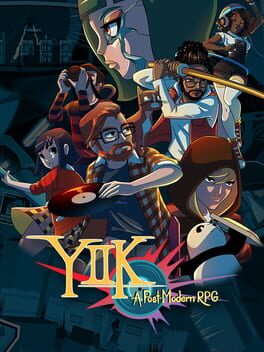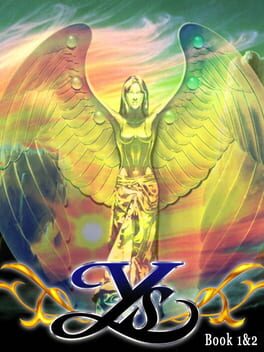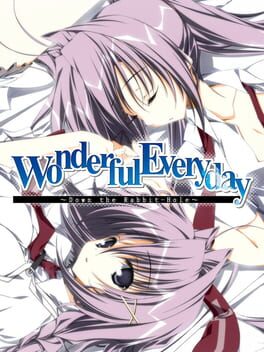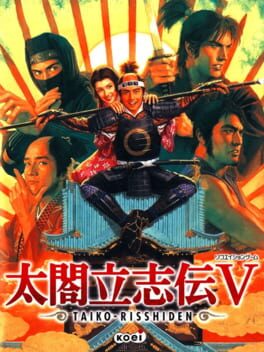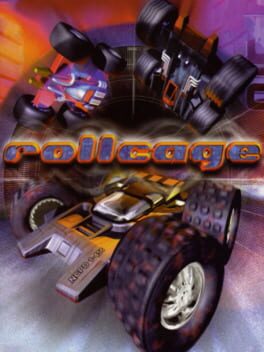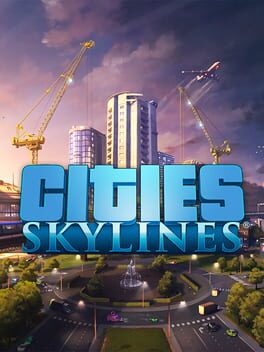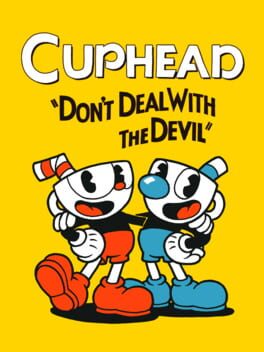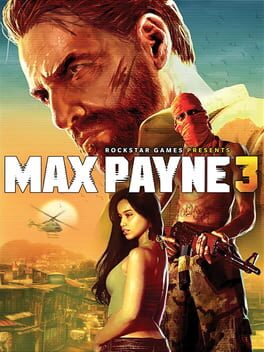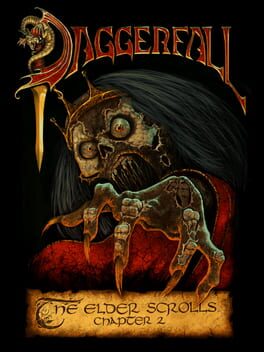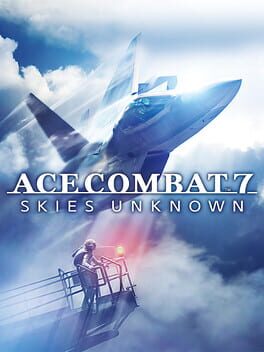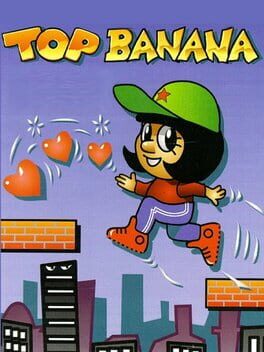214 Reviews liked by anita
Jet Grind Radio
2000
I'm not sure what's more insane, the fact that this was pretty much Naganuma's first soundtrack or the fact that he hasn't really done much after this came out. But everyone already knows how much of a stylistic gem Jet Set Radio is, so instead I'll go into some of the lesser appreciated details that makes it a great game and try to keep my humming the bassline to a minimum. It's a game that sucks until you're good at it, which is probably the best kind of game there is. It's a real shame that the definition of "intuitive" has switched to "stuff that I get instantly" from "stuff I can pick up on easily," because I much prefer the latter. I really don't want to know everything right off that bat- the act of learning how to do things is what I'm interested in, and is one of the biggest reasons why I like video games as a medium in the first place. Jet Set Radio's rival encounters aren't only an engaging way to make you feel like you're expanding the size of your gang but also a clever method of cluing you in to shortcuts and tricks that you might not have figured out yourself. It's really fulfilling to observe them in a contained setting and then try them out in a real mission, and it's also exactly how watching someone else skate would play out in real life. The maps are initially given to you in bits and pieces, making it satisfying to use your full mastery of the physics and controls during the final few missions which each contain a full map instead of just a section. DJ Professor K is also a particularly genius inclusion. He's great at establishing and then perpetuating the level of energy that the game requires, but more importantly narrates in an aggressively present tense, propping up the setting and your active role in the story in a way you really don't see that often. I like this game too much to do anything but gloss over its pretty glaring problems. The enemies and health system are underdeveloped (they're hazards more than enemies and most of the time your best option is just tanking damage), there's a decent amount of technical problems (there's zero difference between walls you can and can't wall run on), and one really misplaced flashback section (not to mention the lamest final boss ever conceived). By all accounts, it meets my definition of a flawed masterpiece. But who cares? ROCK THAT SHIT, HOMIE!
Despite still being a much debated topic among gamers, I'm fairly certain that many here would agree with the notion that gameplay isn't necessarily the end all be all core of a videogame that validates it in the eyes of its critics, with many well renowned beloved classics owing a fair deal of their reputation and prestige to their presentation and art style, in some cases exclusively so. It's a fine line between the legwork a videogame's interactivity does and the heavy lifting its audiovisual design achieves, some works being so successful in that tug of war that they are able to ride on the coattails of their aesthetic alone. Does El Shaddai pull it off?
Sort of. It's an inspired visual kaleidoscope of arresting fantastical landscapes that reinterpret ancient hebrew religious text depicting the kingdom of the fallen angels who caused the Great Flood through cel shaded watercolored vignettes and bright vivid shades that still stand the test of time. My issues with El Shaddai however rest in its ability to use its biggest strength to communicate the imagery and themes of the source material it tries to interpret.
Putting aside the serviceable combat mechanics that are the bulk of the gameplay experience and reach their apex short of the halfway point, El Shaddai struggles with keeping the player invested in its storyline, hoping that its visual splendor suffices. The disparate tonal shifts, lackluster cast and off the wall liberties the game indulges on, while leading to some successful endeavours like the fantastic rendition of Azazel's domain in Chapter 6, more often than not end up with vacuous and dry shallow confrontations that fail to explore and engage with the text besides superficial tracing of it.
A videogame doesn't necessarily need gameplay, but it's not enough to just be beautiful. In contrast to Okami's reverence for the Shinto religion, El Shaddai is not able to convey the power, majesty and beauty of the imagery it apes from, despite how grandiose and colorful it wants you to see it as. Still, El Shaddai is a curious oddity that baffingly got greenlit during the 7th gen of consoles, and the acid trip is more than worth the price of admission. But you can sort of understand why it never turned into an ICO or a Rez in its proceeding years.
Sort of. It's an inspired visual kaleidoscope of arresting fantastical landscapes that reinterpret ancient hebrew religious text depicting the kingdom of the fallen angels who caused the Great Flood through cel shaded watercolored vignettes and bright vivid shades that still stand the test of time. My issues with El Shaddai however rest in its ability to use its biggest strength to communicate the imagery and themes of the source material it tries to interpret.
Putting aside the serviceable combat mechanics that are the bulk of the gameplay experience and reach their apex short of the halfway point, El Shaddai struggles with keeping the player invested in its storyline, hoping that its visual splendor suffices. The disparate tonal shifts, lackluster cast and off the wall liberties the game indulges on, while leading to some successful endeavours like the fantastic rendition of Azazel's domain in Chapter 6, more often than not end up with vacuous and dry shallow confrontations that fail to explore and engage with the text besides superficial tracing of it.
A videogame doesn't necessarily need gameplay, but it's not enough to just be beautiful. In contrast to Okami's reverence for the Shinto religion, El Shaddai is not able to convey the power, majesty and beauty of the imagery it apes from, despite how grandiose and colorful it wants you to see it as. Still, El Shaddai is a curious oddity that baffingly got greenlit during the 7th gen of consoles, and the acid trip is more than worth the price of admission. But you can sort of understand why it never turned into an ICO or a Rez in its proceeding years.
I had to see this one with my own two eyes for some twisted and self hurting reason, and boy was everyone right about how baffling and grueling of a self absorbed mess this one is. To me, YIIK represents the apex of the indie scene's obssession with the egocentric tortured artist narrative that has been the go-to window dressing for many of the critical darlings of the last decade, mostly due to how badly it fails on the execution of said concept.
Andrew Allanson makes his case for Alex's incredible lack of charisma and likeability by implying that those were intented attributes deliberately written to present an unlikely protagonist that defies the expectations of videogame conventions and serves to tell a "meaningful and thought provoking" narrative, but I do have to question if Andrew understands that you can write unredeemable pieces of shit and still have them be compelling people to follow, not unlike the characters from the inumerous prestigious novels and movies he so eagerly name drops as influences. The voice behind Alex's obnoxious and verbose inner thoughts and social interactions permeates most of YIIK's world and people, bloating the whole experience with an onslaught of solipsistic musings that would make your teen self cringe and inner world exposition dumps that would make Kojima blush, and a group of characters lacking in so much chemistry and entertaining banter that fill the game's dead air with loud meaningless conversations that made me appreciate how much of an art what Persona does is.
Tying it all up, you have one of the most unpleasant combat systems I have ever had the displeasure of experiencing in an rpg. A third of the way through I had to turn on Story Mode and Assist Mode while fast forwarding as much as I could, and I shudder to think of the people who subjected themselves to the rest of the game without resorting to any of those settings. There are design choices made here where I struggle to believe that someone made them without deliberately trying to make this combat system a living hell to wrestle with for 20 hours. Andrew infamously stated that if people aren't able to appreciate his game, then "games aren't art, but toys for children", an idea that I find very insincere when he himself has brushed aside the strengths of the medium as mere tools in service of his literary interests and fails to recognize the gameplay value of the many games he apes from and that already disprove his perception of the audience.
I have seen comparisons made between YIIK and The Room, and while YIIK's team has immensely more talent than whatever Tommy Wiseau has, I do see where that's coming from. You aren't so much in it to experience the art presented to you, as much as you are to see the psychosis of the artist behind it, and YIIK does have its poignant and head turning moments that reach Pathologic levels of antagonism towards the player that reveal some kind of accidental genius behind its aggresively mediocre facade. Not only does the world of YIIK unironically revolve around Alex by the end of the game, he implicates you in his self importance and passes onto you his responsibilities and obligations to be a better person, and I find the audacity and nerve to do that...kinda brilliant??, more so deserving of the pretentious "Postmodern RPG" moniker than the Earthbound/Mother 3 gimped 4th wall breaks or the doubt seered into me each time the loading screen tip "videogames are not a waste of time" popped up.
And dont get me wrong, thinking that YIIK is some misunderstood masterpiece of game design or secretely a arthouse cult classic in the making. Judging by Andrew's defensive posture when talking about the game's reception and the passive aggressiveness he slides into the game's updates, much of the artistic merit that can be inferred from YIIK is most likely just a pure casualty of someone trying to aspire to his influences and falling way short of the mark, and suggesting that most of it was intentional would be implying that someone could have the talent to consciously write and design as badly as YIIK was. But Andrew made art here, not the kind of art he wanted to make, but art nonetheless, and I do find more value in this relentlessly life draining game than most indie artsy fartsy games out there. I play YIIK and I see a sincere attempt at creating something unique and different, scrambling ideas from every piece of fiction the creator cherishes and throwing it at the wall to see what sticks, not having the self awareness to realize its own mediocrity or how misplaced and misguised many of those ideas might be, and I can definitely sympathize and relate to that.
PS: The Iwata "tribute" is the most unintentionally hilarious bit in the whole game. You have the power of videogames to make anything you want, and you put the man in a fucking tombstone.
Andrew Allanson makes his case for Alex's incredible lack of charisma and likeability by implying that those were intented attributes deliberately written to present an unlikely protagonist that defies the expectations of videogame conventions and serves to tell a "meaningful and thought provoking" narrative, but I do have to question if Andrew understands that you can write unredeemable pieces of shit and still have them be compelling people to follow, not unlike the characters from the inumerous prestigious novels and movies he so eagerly name drops as influences. The voice behind Alex's obnoxious and verbose inner thoughts and social interactions permeates most of YIIK's world and people, bloating the whole experience with an onslaught of solipsistic musings that would make your teen self cringe and inner world exposition dumps that would make Kojima blush, and a group of characters lacking in so much chemistry and entertaining banter that fill the game's dead air with loud meaningless conversations that made me appreciate how much of an art what Persona does is.
Tying it all up, you have one of the most unpleasant combat systems I have ever had the displeasure of experiencing in an rpg. A third of the way through I had to turn on Story Mode and Assist Mode while fast forwarding as much as I could, and I shudder to think of the people who subjected themselves to the rest of the game without resorting to any of those settings. There are design choices made here where I struggle to believe that someone made them without deliberately trying to make this combat system a living hell to wrestle with for 20 hours. Andrew infamously stated that if people aren't able to appreciate his game, then "games aren't art, but toys for children", an idea that I find very insincere when he himself has brushed aside the strengths of the medium as mere tools in service of his literary interests and fails to recognize the gameplay value of the many games he apes from and that already disprove his perception of the audience.
I have seen comparisons made between YIIK and The Room, and while YIIK's team has immensely more talent than whatever Tommy Wiseau has, I do see where that's coming from. You aren't so much in it to experience the art presented to you, as much as you are to see the psychosis of the artist behind it, and YIIK does have its poignant and head turning moments that reach Pathologic levels of antagonism towards the player that reveal some kind of accidental genius behind its aggresively mediocre facade. Not only does the world of YIIK unironically revolve around Alex by the end of the game, he implicates you in his self importance and passes onto you his responsibilities and obligations to be a better person, and I find the audacity and nerve to do that...kinda brilliant??, more so deserving of the pretentious "Postmodern RPG" moniker than the Earthbound/Mother 3 gimped 4th wall breaks or the doubt seered into me each time the loading screen tip "videogames are not a waste of time" popped up.
And dont get me wrong, thinking that YIIK is some misunderstood masterpiece of game design or secretely a arthouse cult classic in the making. Judging by Andrew's defensive posture when talking about the game's reception and the passive aggressiveness he slides into the game's updates, much of the artistic merit that can be inferred from YIIK is most likely just a pure casualty of someone trying to aspire to his influences and falling way short of the mark, and suggesting that most of it was intentional would be implying that someone could have the talent to consciously write and design as badly as YIIK was. But Andrew made art here, not the kind of art he wanted to make, but art nonetheless, and I do find more value in this relentlessly life draining game than most indie artsy fartsy games out there. I play YIIK and I see a sincere attempt at creating something unique and different, scrambling ideas from every piece of fiction the creator cherishes and throwing it at the wall to see what sticks, not having the self awareness to realize its own mediocrity or how misplaced and misguised many of those ideas might be, and I can definitely sympathize and relate to that.
PS: The Iwata "tribute" is the most unintentionally hilarious bit in the whole game. You have the power of videogames to make anything you want, and you put the man in a fucking tombstone.
Ys: Book I & II
1989
When it comes to "technical milestones in gaming history", we think about our Dooms, or Star Foxes, our Mario 64s, our FF7s. But never does Ys Book I & II come up.
This was an epic 20-hour two-part RPG with animated cutscenes, fully-fledged professional voice acting in both Japanese and English, arranged OST using real CD instruments, and extensive side content all in 1989. A 500MB game in a time when games rarely exceeded 500KB. And it was all done by a small Japanese studio. This is one for the history books and it's a shame it doesn't get the respect the deserves.
As for the game itself, though? Haha, bump combat go BRRRRRRBRBRBRBRRRBRRBRR
This was an epic 20-hour two-part RPG with animated cutscenes, fully-fledged professional voice acting in both Japanese and English, arranged OST using real CD instruments, and extensive side content all in 1989. A 500MB game in a time when games rarely exceeded 500KB. And it was all done by a small Japanese studio. This is one for the history books and it's a shame it doesn't get the respect the deserves.
As for the game itself, though? Haha, bump combat go BRRRRRRBRBRBRBRRRBRRBRR
This review contains spoilers
finished and thought abt it and i dont think it was worth it. i have to admit even tho i wanted to try this, stories centered around "what doth life" existential shit (you can tell me im missing the point of wittgenstein to call his work that but you know what im saying) arent my thing, so maybe this shouldnt be too surprising. but also feel like jabberwocky onwards is just not interesting at all. kind of hate the sol and not vibing w it makes the whole message abt finding happiness in fiction n fantasy fall flat for me. i expected otaku horny/in-jokes and siscon going in, but not to the extent that it practically felt like all youd be getting for comedy by that point (along w the exhausting homophobia). and the incest quasi or otherwise just being so insistently thematically positioned as "ideal" is way too rancid for me to want to pull a kinder interpretation on out of my ass, or to compartmentalize as eroge bs. on god would trudge thru however many more rape scenes if it meant hasaki disappeared from the story.
mixed feelings on end sky ii. i respect it as an assertion that the story is artificial, and how it makes it so that analysis of everything in subahibi has to grapple with that artificiality. like how that eventually leads the player to outwardly build a matroyshka doll of sense-subject, going from tomo->yuki->ayana to arrive at the outermost(?) metanarrative shell on their own, as close as it can be done without spelling it out--felt like what kept sca-ji from replacing ayana w himself is just the unspoken rule that inserting yourself directly is lame. but the ending being intentionally divorced from the story's drama just makes it clear that this lacks something for me to get attached to. i can appreciate parts of subahibi as a thought experiment with some honestly poetic diary-ish bits here and there, but its hardly got anything special going on in the character department, which is kind of what i wanted most. IMOI might be the best chapter despite my gripes for showing the most potential for this, but now it feels like it doesnt mean much at the end. idk. its all open to interpretation sure but the idea is to be happy living in a fiction, and this one doesnt bring that out of me.
mixed feelings on end sky ii. i respect it as an assertion that the story is artificial, and how it makes it so that analysis of everything in subahibi has to grapple with that artificiality. like how that eventually leads the player to outwardly build a matroyshka doll of sense-subject, going from tomo->yuki->ayana to arrive at the outermost(?) metanarrative shell on their own, as close as it can be done without spelling it out--felt like what kept sca-ji from replacing ayana w himself is just the unspoken rule that inserting yourself directly is lame. but the ending being intentionally divorced from the story's drama just makes it clear that this lacks something for me to get attached to. i can appreciate parts of subahibi as a thought experiment with some honestly poetic diary-ish bits here and there, but its hardly got anything special going on in the character department, which is kind of what i wanted most. IMOI might be the best chapter despite my gripes for showing the most potential for this, but now it feels like it doesnt mean much at the end. idk. its all open to interpretation sure but the idea is to be happy living in a fiction, and this one doesnt bring that out of me.
Taikou Risshiden V
2004
I am sceptical about the word freedom in games. Especially when it comes to the word "freedom" in RPGs.
Even I, such a twisted person, couldn't deny the freedom in this Taikou Risshiden V. What makes it free is that, apart from the constraints of the warring states and the geography of the Japanese archipelago, everything is free. It is unlikely that any other game of the Sengoku period offers so much freedom.
At the start of the game, there are five characters that can be controlled.
The first. Hideyoshi, is the protagonist of the series. He is one of the greatest figures in Japanese medieval history. Hideyoshi's play is a standard game. He works as a subordinate of Nobunaga Oda, achieving his goals and sometimes going to the battlefield to rise through the ranks. This is a great way to experience the rise of the warlords(下剋上。The description on the English Wikipedia is very subtle).
The second. Hattori Hanzo. He's everyone's favourite ninja. He supports the country by undertaking dirty work such as infiltrating enemy territory.
The third. Yagyū Munetoshi(Sekishusai). A great swordsman. This is a play to DO KATANAKILL with the very popular samurai sword.
The fourth. Kuki Yoshitaka. Japanese pirates, Vikings of Japan. It's like the Englishman of old.
The fifth. Naya Sukezaemon. A merchant. Kansai people haven't progressed a millimetre since these days!
In addition to these five, you can control more than 800 other characters. (Of course, only after you have achieved the conditions.)
You can play the following roles in Taikou V.
Bushi, Ninja, Swordman, Viking, Merchant, Doctor, Blacksmith, and Tea master.
Tea Master play, I haven't tried it yet, but I'd like to try it sometime. (For those of you who know the manga "Hyouge-mono". That's right, that's the manga)
The Hideyoshi play is typical: you are free to do whatever you want, although there are certain restrictions. In Bushi play, orders can be completed in a short time and you can earn money or improve your skills until the report deadline, or you can become a scab at a gambling game. Every character has his or her own strengths and weaknesses, but there is almost nothing that cannot be done. Even if you start as a warrior, you can stop being a warlord and become a doctor or a tea master. (We can't guarantee that it will be fun to play.)
KOEI was very proud of this game and it was well received, but... But the sales did not increase!
But I'm annoyed at KOEI's laziness in not even doing that, when they could just do a light port and sell it on steam.
The reason why I bring up Taikou Rishiden nowadays is because Hideyoshi died in Sengoku, which is serialized in Weekly Young Magazine.
It was as good a way to die as the one in "Hyouge-mono".
露と落ち 露と消えにし 我が身かな 浪速のことは 夢のまた夢
Even I, such a twisted person, couldn't deny the freedom in this Taikou Risshiden V. What makes it free is that, apart from the constraints of the warring states and the geography of the Japanese archipelago, everything is free. It is unlikely that any other game of the Sengoku period offers so much freedom.
At the start of the game, there are five characters that can be controlled.
The first. Hideyoshi, is the protagonist of the series. He is one of the greatest figures in Japanese medieval history. Hideyoshi's play is a standard game. He works as a subordinate of Nobunaga Oda, achieving his goals and sometimes going to the battlefield to rise through the ranks. This is a great way to experience the rise of the warlords(下剋上。The description on the English Wikipedia is very subtle).
The second. Hattori Hanzo. He's everyone's favourite ninja. He supports the country by undertaking dirty work such as infiltrating enemy territory.
The third. Yagyū Munetoshi(Sekishusai). A great swordsman. This is a play to DO KATANAKILL with the very popular samurai sword.
The fourth. Kuki Yoshitaka. Japanese pirates, Vikings of Japan. It's like the Englishman of old.
The fifth. Naya Sukezaemon. A merchant. Kansai people haven't progressed a millimetre since these days!
In addition to these five, you can control more than 800 other characters. (Of course, only after you have achieved the conditions.)
You can play the following roles in Taikou V.
Bushi, Ninja, Swordman, Viking, Merchant, Doctor, Blacksmith, and Tea master.
Tea Master play, I haven't tried it yet, but I'd like to try it sometime. (For those of you who know the manga "Hyouge-mono". That's right, that's the manga)
The Hideyoshi play is typical: you are free to do whatever you want, although there are certain restrictions. In Bushi play, orders can be completed in a short time and you can earn money or improve your skills until the report deadline, or you can become a scab at a gambling game. Every character has his or her own strengths and weaknesses, but there is almost nothing that cannot be done. Even if you start as a warrior, you can stop being a warlord and become a doctor or a tea master. (We can't guarantee that it will be fun to play.)
KOEI was very proud of this game and it was well received, but... But the sales did not increase!
But I'm annoyed at KOEI's laziness in not even doing that, when they could just do a light port and sell it on steam.
The reason why I bring up Taikou Rishiden nowadays is because Hideyoshi died in Sengoku, which is serialized in Weekly Young Magazine.
It was as good a way to die as the one in "Hyouge-mono".
露と落ち 露と消えにし 我が身かな 浪速のことは 夢のまた夢
Rollcage
1999
Revisiting a Childhoode Favve ❤❤❤❤
Late 90's electronica soundtrack filled with out and out bangers. Fatboy Slim and Aphrodite aggressively sampling the Dune movie as u bounce from wall to floor to ceiling with the frankly inspired ""Big Wheels"" innovation. Ultimately only an okay combat racer, coasts by in large part due to the overall presentation (the stages are surprisingly explosive for a PS1 game) and the genuinely satisfying feel of the big weighty vehicles' handling. Some of the enemy weaponry is just downright annoying to get hit by and obscures your vision with multicoloured blurry effects - but this game's entire M.O. is to give you eccie sweats and for all intents and purposes it succeeds.
Late 90's electronica soundtrack filled with out and out bangers. Fatboy Slim and Aphrodite aggressively sampling the Dune movie as u bounce from wall to floor to ceiling with the frankly inspired ""Big Wheels"" innovation. Ultimately only an okay combat racer, coasts by in large part due to the overall presentation (the stages are surprisingly explosive for a PS1 game) and the genuinely satisfying feel of the big weighty vehicles' handling. Some of the enemy weaponry is just downright annoying to get hit by and obscures your vision with multicoloured blurry effects - but this game's entire M.O. is to give you eccie sweats and for all intents and purposes it succeeds.
Azusa 999
1997
What an amazing and deep train journey.
The stories told were short but intense, and all the messages were clear. Also, its so interesting seeing how a 1997’s young man has portrayed its present in a videogame, using it as a way to, maybe, express how he feels about the age he’s living.
Also BIG BIG shoutout to (insertar nombre del traductor) for its AMAZING work translating it and building the companion book so we could get all the context, so we understand the author’s references. It makes the hole game experience much richer.
The stories told were short but intense, and all the messages were clear. Also, its so interesting seeing how a 1997’s young man has portrayed its present in a videogame, using it as a way to, maybe, express how he feels about the age he’s living.
Also BIG BIG shoutout to (insertar nombre del traductor) for its AMAZING work translating it and building the companion book so we could get all the context, so we understand the author’s references. It makes the hole game experience much richer.
Cities: Skylines
2015
Cuphead
2017
Max Payne 3
2012
i like the idea of daggerfall. enough so that i've tried playing it numerous times, keen on trying to understand what its most fervent enjoyers find so magical about it. i've always come out of it feeling like, well, the time i might have appreciated this game has long passed me by. or even more accurately, that time has never truly existed and likely never will. i was playing chrono trigger, quake, and super mario 64 while a much nerdier friend of mine pretty much only cared about daggerfall (so much so that he sold me his fairly new playstation with a handful of games like resident evil and king's field really cheaply). given that i still love the games i found more interesting back then—especially when most of the praise i see for it nowadays is "it's very, very big and full of endless copy-pasted npcs who give you the dullest quests imaginable" or perhaps "tits"—it's ever more difficult for me to imagine an alternate timeline where i switched places with my friend.
so, again: the core idea of daggerfall really appeals to me. a vast, open world with enormous and labyrinthine underground crypts full of screaming skeletons. crude 3d environments with even cruder prerendered sprites. let's go. but then it becomes clear just how empty it is both spatially and in terms of character. morrowind is a fucking revelation compared to this. morrowind is one of my very favorite games. daggerfall, though... it's practically a barebones prototype (and i'll grant it due credit there) for what would become an actual game with an actual soul and vision. if you were to ask me: play ultima underworld instead of this monumental time-waster and then skip ahead to morrowind (perhaps stopping along the way for deus ex, arx fatalis, etc).
so, again: the core idea of daggerfall really appeals to me. a vast, open world with enormous and labyrinthine underground crypts full of screaming skeletons. crude 3d environments with even cruder prerendered sprites. let's go. but then it becomes clear just how empty it is both spatially and in terms of character. morrowind is a fucking revelation compared to this. morrowind is one of my very favorite games. daggerfall, though... it's practically a barebones prototype (and i'll grant it due credit there) for what would become an actual game with an actual soul and vision. if you were to ask me: play ultima underworld instead of this monumental time-waster and then skip ahead to morrowind (perhaps stopping along the way for deus ex, arx fatalis, etc).
an excellent collection of 'moments' (if you ignore that its pastiche/regressive nostalgia, they're all ripped off whole-sale from past entries in the series, which uniformly executed them better) but a legitimate trainwreck of a narrative built on one flimsy justification after the other. i unfortunately lost a lot of my goodwill and charitability towards the game in the last quarter of this meandering, directionless, and deeply hypocritical/ill-considered work. would rather be playing this over 5 but it's not saying much. ive said it before but AC's base of mechanics are in my wheelhouse entirely, and without very much in the way of improvement or alterations to the formula i'll end up looking to other factors in assessing any given title here but man this was such an exhausting disappointment im not even sure i want to unpack it, i'm not sure it's worth my time. a mess in every single way.
okay maybe there's one thing i want to address. there's a bit in ace combat zero that i love; a faceless and nameless belkan squadron intercepts your sortie. at first, the player is led to believe they are yet more threats to quarrel with, but the squadron instead begins attacking the enemies you had already begun duelling - belkan bombers who intended to bring a fiery end to the war through means of nuclear self-immolation. in keeping with ac0s themes, how you engage with this neutral squadron is up to you - and their names are never revealed, ultimately buried by nuclear ash in the annals of history. but they were lone actors in a campaign marked by a quite complicated and nuanced war effort, singularly opposed to a crime against humanity at the hands of their nationalist, authoritarian generals.
ac7 ends up making the argument that belkans are innately evil warmongers who just cant stop engaging in conspiracy and stirring international conflict as revenge for the past lol. you can see how the person behind ac5 spearheaded this games script. any game that earnestly tries to make the argument that drone warfare is bad but fighter jets are cool and good should probably be laughed at. doubly so if the protagonist fights for the in-universe analogue for america against these drones, which are manufactured by an antagonistic state for which drone warfare would only be beneficial in reducing the casualties of war. triply so if the in-universe america analogue was repeatedly shown in the campaign to be obscenely incompetent and corrupt, forcing convicts to be conscript forces, and this goes unquestioned. or if a late-game mission involved you and your band of unlikeable cronies raiding and indiscriminately tearing through an independent separatist state filled with refugees to 'stock up on supplies' with no oversight from higher authorities, and this was the narratives stab at posturing moral ambiguity. but yeah man drones are bad
i dunno man AC3 and 0 are proof you can have it all in this series. cohesive and fantastically considered storytelling, tight core gameplay that has been tweaked to serve the titles themes, immense replayability…so much of that is neutered here, and even if i only craved the simplicity of arcade sensibilities i could still turn to ace combat 2 or x instead. understandable how AC7 managed to find a new audience, but an exasperating disappointment for series veterans.
okay maybe there's one thing i want to address. there's a bit in ace combat zero that i love; a faceless and nameless belkan squadron intercepts your sortie. at first, the player is led to believe they are yet more threats to quarrel with, but the squadron instead begins attacking the enemies you had already begun duelling - belkan bombers who intended to bring a fiery end to the war through means of nuclear self-immolation. in keeping with ac0s themes, how you engage with this neutral squadron is up to you - and their names are never revealed, ultimately buried by nuclear ash in the annals of history. but they were lone actors in a campaign marked by a quite complicated and nuanced war effort, singularly opposed to a crime against humanity at the hands of their nationalist, authoritarian generals.
ac7 ends up making the argument that belkans are innately evil warmongers who just cant stop engaging in conspiracy and stirring international conflict as revenge for the past lol. you can see how the person behind ac5 spearheaded this games script. any game that earnestly tries to make the argument that drone warfare is bad but fighter jets are cool and good should probably be laughed at. doubly so if the protagonist fights for the in-universe analogue for america against these drones, which are manufactured by an antagonistic state for which drone warfare would only be beneficial in reducing the casualties of war. triply so if the in-universe america analogue was repeatedly shown in the campaign to be obscenely incompetent and corrupt, forcing convicts to be conscript forces, and this goes unquestioned. or if a late-game mission involved you and your band of unlikeable cronies raiding and indiscriminately tearing through an independent separatist state filled with refugees to 'stock up on supplies' with no oversight from higher authorities, and this was the narratives stab at posturing moral ambiguity. but yeah man drones are bad
i dunno man AC3 and 0 are proof you can have it all in this series. cohesive and fantastically considered storytelling, tight core gameplay that has been tweaked to serve the titles themes, immense replayability…so much of that is neutered here, and even if i only craved the simplicity of arcade sensibilities i could still turn to ace combat 2 or x instead. understandable how AC7 managed to find a new audience, but an exasperating disappointment for series veterans.
Death Stranding
2019
An incredibly perculiar AAA game. Really appreciated my time with it. The real highlights of this game are the movement mechanics and the setting.
The basis of the gameplay in Death Stranding is movement. For the majority of the first part of the game, the game centres purely around walking and how to tackle the terrain. I applaud the idea of a large game trying to add a challenge and a full feature set towards something as simple as how you walk across a distance, it's kinda like an opposite Mario in that you have all this focus on movement mechanics but instead of making them feel smooth and tight it's all about making it feel challenging and slow. For someone who went into the game expecting a lot of tedium with the gameplay, I was surprised at how zen and rewarding they made it. Like, I'm not going to lie to you and say I didn't fully utilise a full zipline network by the end of the game because I didn't want to walk anywhere anymore but for the moments where the game makes you tackle the idea of traversal OUTSIDE of ziplines...it's actually really neat. Part of me kinda wishes ziplines weren't in the game, despite their great convenience for grinding the game out. Maybe I'd say the same for vehicles. Imagine a game that was maybe a bit more focused on smaller, more interesting environments where you could only tackle them on foot. Hmmmm....
The other thing I really wanna point out is the world of Death Stranding. It's by far the most unique and interesting part of the game and I have to give Kojima credit for making a very unique apocalypse, since it would have been so easy to just go for something a bit more generic and drab. Instead he decided to give us baby technology, upside down rainbows, rain that makes time go faster and lore on how drugs are used by people who are addicted to likes. Thanks Kojima.
The thing that ultimately brings the entire thing down though is the story. Everything with Amelie sucks. There was something kinda interesting in the idea of a grim reaper with a heart but it doesn't explore it enough and honestly I can't remember enough to tell you even what Amelie's whole thing was. I just remember being pretty unenfused about her and her whole story...which sucks because she's pretty much the main focus of the entire game and the payoff with her just isn't great. Actually, that Princess Beach scene was amazing. Nevermind, she was worth it after all. Also Higgs sucks. Troy Baker needs to stay away from cool rival characters because whenever he plays one they suck.
Saying that I didn't mind the other characters. The stuff with Cliff and Die Hardman was kinda cool, just a shame they don't get more stuff. BB is precious. I guess I have a problem overall with the writing of the characters. The more I think about it, the more there really isn't a stand out winner for me. They're just kinda around.
But oh man honestly, genuinely, the one thing that kepts the characters completely back for me was the use of real actors. Why? What did doing any of this add? I don't know if it's just me but I found them to be INCREDIBLY distracting. Like, why not just use a character design...y'know? Like, why not just have a unique face for the character that matches them and let the character design be as expressive as they wanted without having to worry about fitting a real person onto it. Why is Amelie based on Lindsey Wagner out of the six million dollar man? How is that not just a terrible thing for your character who is also the main point of the game and a death god? God it annoys me.
Overall though, I'd say Death Stranding is a pretty good game based on how unique of a project it is. Shortcomings with the main plot and characters aside, I enjoyed my time with it and I hope Kojima continues sticking to making games like this, now that he's freed from the chains of Metal Gear. Maybe get another dude in to help write next time though.
The basis of the gameplay in Death Stranding is movement. For the majority of the first part of the game, the game centres purely around walking and how to tackle the terrain. I applaud the idea of a large game trying to add a challenge and a full feature set towards something as simple as how you walk across a distance, it's kinda like an opposite Mario in that you have all this focus on movement mechanics but instead of making them feel smooth and tight it's all about making it feel challenging and slow. For someone who went into the game expecting a lot of tedium with the gameplay, I was surprised at how zen and rewarding they made it. Like, I'm not going to lie to you and say I didn't fully utilise a full zipline network by the end of the game because I didn't want to walk anywhere anymore but for the moments where the game makes you tackle the idea of traversal OUTSIDE of ziplines...it's actually really neat. Part of me kinda wishes ziplines weren't in the game, despite their great convenience for grinding the game out. Maybe I'd say the same for vehicles. Imagine a game that was maybe a bit more focused on smaller, more interesting environments where you could only tackle them on foot. Hmmmm....
The other thing I really wanna point out is the world of Death Stranding. It's by far the most unique and interesting part of the game and I have to give Kojima credit for making a very unique apocalypse, since it would have been so easy to just go for something a bit more generic and drab. Instead he decided to give us baby technology, upside down rainbows, rain that makes time go faster and lore on how drugs are used by people who are addicted to likes. Thanks Kojima.
The thing that ultimately brings the entire thing down though is the story. Everything with Amelie sucks. There was something kinda interesting in the idea of a grim reaper with a heart but it doesn't explore it enough and honestly I can't remember enough to tell you even what Amelie's whole thing was. I just remember being pretty unenfused about her and her whole story...which sucks because she's pretty much the main focus of the entire game and the payoff with her just isn't great. Actually, that Princess Beach scene was amazing. Nevermind, she was worth it after all. Also Higgs sucks. Troy Baker needs to stay away from cool rival characters because whenever he plays one they suck.
Saying that I didn't mind the other characters. The stuff with Cliff and Die Hardman was kinda cool, just a shame they don't get more stuff. BB is precious. I guess I have a problem overall with the writing of the characters. The more I think about it, the more there really isn't a stand out winner for me. They're just kinda around.
But oh man honestly, genuinely, the one thing that kepts the characters completely back for me was the use of real actors. Why? What did doing any of this add? I don't know if it's just me but I found them to be INCREDIBLY distracting. Like, why not just use a character design...y'know? Like, why not just have a unique face for the character that matches them and let the character design be as expressive as they wanted without having to worry about fitting a real person onto it. Why is Amelie based on Lindsey Wagner out of the six million dollar man? How is that not just a terrible thing for your character who is also the main point of the game and a death god? God it annoys me.
Overall though, I'd say Death Stranding is a pretty good game based on how unique of a project it is. Shortcomings with the main plot and characters aside, I enjoyed my time with it and I hope Kojima continues sticking to making games like this, now that he's freed from the chains of Metal Gear. Maybe get another dude in to help write next time though.
Top Banana
1992
the discrepancy between top banana's advertised aesthetic, signified by its cover art, and the manifestly psychedelic artwork reflected within is ferociously disorienting. ive never felt such abrasive whiplash, anticipating a rote and teed-up but hamfistedly executed platformer and getting instead what can only be described as environmental rave horror.
im pretty happy to walk into games knowing next to nothing these days, people love inadvertently ruining the joy of discovery online nowadays. i sat there for half an hour, adjusting the settings of my amiga emulator, trying to get this damn thing to work with no knowledge of the games mechanics or stylings. for a time i was accompanied only by the lovingly recreated whirring and chugging of the amiga emulator reading my floppy disk files, presumably orchestrated so as to reflect the sounds an actual amiga might make. we're segued into the game with a loop of a music video entitled 'Global Chaos' featuring protagonist KT, and then momentarily halted by copy-protection as the game asks us to use a specific word from the game's manual as passcode. following this, the player is unceremoniously thrust into the game proper and finds they must contend with an arcane control scheme. z moves left, x moves right, the enter key fires hearts, the quote key jumps, and the / key will stop jump momentum at any interval, bringing you down to a platform.
according to the manual, top banana's world is facing calamity: "not from slimy aliens or evil wizards but from direct consequences of our own greed and stupidity." in plainer terms, corresponding to the systems of the game itself, the manual lets us know the goal is simple: reach the top of the stage, prove your skill and courage in the material world, and become the top banana after seeking ultimate wisdom in the Mind-Scape. along the way you navigate perilous floods and you vanquish foes, among them bulldozers and emaciated individuals, with the power of love, akin to an off-kilter love-de-lic experience. it would be a straightforward endeavour were it not for some frankly eerie sound design, evocative of silent hill and siren, setting the tone for the experience. note that i wouldnt make that comparison lightly. this is compounded further by some genuinely eye-straining and cluttered visuals.
and this is where my interests in top banana as an ineffectual and rudimentary, but otherwise somewhat functional platformer end and my interest in top banana as an aesthetic experience begin, something of a vulgar, perverse mother 3. because it's clearly not up to snuff as an arcade platformer - controls are slippery, the ruleset is abundantly unclear, visuals are sometimes indecipherable, the effects of powerups are very rarely beneficial - despite being obsequious to the general rule of thumbs for a variety of very difficult arcade platformers, ie directing the player to adhere to a strict choreography in order to progress effectively. but it is, in many ways, something of a forward-thinking experience that could only have been constructed by a multimedia collective, not fully dedicated to games but instead interested in their form, structure, and conveyance. a lot of the spritework and textures in top banana wouldn't feel too out of place in something from jack king-spooner's body of work (like a boss that's a cross between a police helmet and a spider), with the claustrophobia of its platforming feeling not dissimilar from itch.io works, or something like problem attic. and obviously the sound design is very much worth mentioning too, with its rainforest stages all sounding like a turbulent mix of either raging fires in the distance or generic jungle ambience; the mind can't quite decide initially. all told, the game's environmentalist journey has you traverse hollowed-out industrial cities, crumbling religious temples, and a "psychedelic hip-house", the haze and splendor of a mind flayed, as you fight against your "fears, dreams, and illusions". kind of earnestly bleak stuff, kicking you back to the starting point ghosts n goblins style, without any felt impact on the world or its inhabitants but instead jeering and laughing from the game itself. love, self-actualization and self-prioritization, and spiritual enlightenment aren't enough in the face of the world's evils, it seems.
i also think it's noteworthy that it takes its environmentalist bent to the furthest extent it can, releasing with environmentally friendly packaging and even allowing for a supposed large breadth of freedom with regards to editing sprites and sound, kind of riffing on that sustainability. put your money where your mouth is and all that, serves as a nice implicit acknowledgment this medium is a nightmare wrt exploitation of environment
it's really quite fascinating playing something that feels modern in sensibilities and tone with relation to the medium, despite releasing into a media zeitgeist already dominated by themes of environmental preservation as it relates to encroaching technological advancement (with even dinosaurs ending with its cast confronting corporate-engineered apocalypse). no doubt in my mind rainbow islands is the better game but there's something about this games tailored spitefulness im enamored with. it's cynical and cruel, i kind of love it. KICK IT TO EM.
im pretty happy to walk into games knowing next to nothing these days, people love inadvertently ruining the joy of discovery online nowadays. i sat there for half an hour, adjusting the settings of my amiga emulator, trying to get this damn thing to work with no knowledge of the games mechanics or stylings. for a time i was accompanied only by the lovingly recreated whirring and chugging of the amiga emulator reading my floppy disk files, presumably orchestrated so as to reflect the sounds an actual amiga might make. we're segued into the game with a loop of a music video entitled 'Global Chaos' featuring protagonist KT, and then momentarily halted by copy-protection as the game asks us to use a specific word from the game's manual as passcode. following this, the player is unceremoniously thrust into the game proper and finds they must contend with an arcane control scheme. z moves left, x moves right, the enter key fires hearts, the quote key jumps, and the / key will stop jump momentum at any interval, bringing you down to a platform.
according to the manual, top banana's world is facing calamity: "not from slimy aliens or evil wizards but from direct consequences of our own greed and stupidity." in plainer terms, corresponding to the systems of the game itself, the manual lets us know the goal is simple: reach the top of the stage, prove your skill and courage in the material world, and become the top banana after seeking ultimate wisdom in the Mind-Scape. along the way you navigate perilous floods and you vanquish foes, among them bulldozers and emaciated individuals, with the power of love, akin to an off-kilter love-de-lic experience. it would be a straightforward endeavour were it not for some frankly eerie sound design, evocative of silent hill and siren, setting the tone for the experience. note that i wouldnt make that comparison lightly. this is compounded further by some genuinely eye-straining and cluttered visuals.
and this is where my interests in top banana as an ineffectual and rudimentary, but otherwise somewhat functional platformer end and my interest in top banana as an aesthetic experience begin, something of a vulgar, perverse mother 3. because it's clearly not up to snuff as an arcade platformer - controls are slippery, the ruleset is abundantly unclear, visuals are sometimes indecipherable, the effects of powerups are very rarely beneficial - despite being obsequious to the general rule of thumbs for a variety of very difficult arcade platformers, ie directing the player to adhere to a strict choreography in order to progress effectively. but it is, in many ways, something of a forward-thinking experience that could only have been constructed by a multimedia collective, not fully dedicated to games but instead interested in their form, structure, and conveyance. a lot of the spritework and textures in top banana wouldn't feel too out of place in something from jack king-spooner's body of work (like a boss that's a cross between a police helmet and a spider), with the claustrophobia of its platforming feeling not dissimilar from itch.io works, or something like problem attic. and obviously the sound design is very much worth mentioning too, with its rainforest stages all sounding like a turbulent mix of either raging fires in the distance or generic jungle ambience; the mind can't quite decide initially. all told, the game's environmentalist journey has you traverse hollowed-out industrial cities, crumbling religious temples, and a "psychedelic hip-house", the haze and splendor of a mind flayed, as you fight against your "fears, dreams, and illusions". kind of earnestly bleak stuff, kicking you back to the starting point ghosts n goblins style, without any felt impact on the world or its inhabitants but instead jeering and laughing from the game itself. love, self-actualization and self-prioritization, and spiritual enlightenment aren't enough in the face of the world's evils, it seems.
i also think it's noteworthy that it takes its environmentalist bent to the furthest extent it can, releasing with environmentally friendly packaging and even allowing for a supposed large breadth of freedom with regards to editing sprites and sound, kind of riffing on that sustainability. put your money where your mouth is and all that, serves as a nice implicit acknowledgment this medium is a nightmare wrt exploitation of environment
it's really quite fascinating playing something that feels modern in sensibilities and tone with relation to the medium, despite releasing into a media zeitgeist already dominated by themes of environmental preservation as it relates to encroaching technological advancement (with even dinosaurs ending with its cast confronting corporate-engineered apocalypse). no doubt in my mind rainbow islands is the better game but there's something about this games tailored spitefulness im enamored with. it's cynical and cruel, i kind of love it. KICK IT TO EM.
